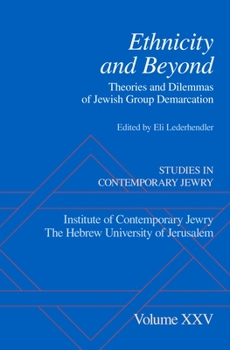Ethnicity and Beyond: Theories and Dilemmas of Jewish Group Demarcation
(Book #25 in the Studies in Contemporary Jewry Series)
Volume XXV of the distinguished annual Studies in Contemporary Jewry explores new understandings and approaches to Jewish "ethnicity." In current parlance regarding multicultural diversity, Jews are often considered to belong socially to the "majority," whereas "otherness" is reserved for "minorities." But these group labels and their meanings have changed over time. This volume analyzes how "ethnic," "ethnicity," and "identity" have been applied to Jews, past and present, individually and collectively. Most of the symposium papers on the ethnicity of Jewish people and the social groups they form draw heavily on the case of American Jews, while others offer wider geographical perspectives. Contributors address ex-Soviet Jews in Philadelphia, comparing them to a similar population in Tel Aviv; Communism and ethnicity; intermarriage and group blending; American Jewish dialogue; and German Jewish migration in the interwar decades. Leading academics, employing a variety of social scientific methods and historical paradigms, propose to enhance the clarity of definitions used to relate "ethnic identity" to the Jews. They point to ethnic experience in a variety of different social manifestations: language use in social context, marital behavior across generations, spatial and occupational differentiation in relation to other members of society, and new immigrant communities as sub-ethnic units within larger Jewish populations. They also ponder the relevance of individual experience and preference as compared to the weight of larger socializing factors. Taken as a whole, this work offers revisionist views on the utility of terms like "Jewish ethnicity" that were given wider scope by scholars in the 1960s, '70s, and '80s.
Format:Hardcover
Language:English
ISBN:0199793492
ISBN13:9780199793495
Release Date:March 2011
Publisher:Oxford University Press, USA
Length:256 Pages
Weight:1.10 lbs.
Dimensions:1.0" x 6.3" x 9.3"
Customer Reviews
0 rating





